Module 6 Problems Unit 3 Language in use 语法课件:状语从句专题讲解(52张)
文档属性
| 名称 | Module 6 Problems Unit 3 Language in use 语法课件:状语从句专题讲解(52张) |  | |
| 格式 | zip | ||
| 文件大小 | 22.9MB | ||
| 资源类型 | 教案 | ||
| 版本资源 | 外研版 | ||
| 科目 | 英语 | ||
| 更新时间 | 2019-12-28 19:18:58 | ||
图片预览

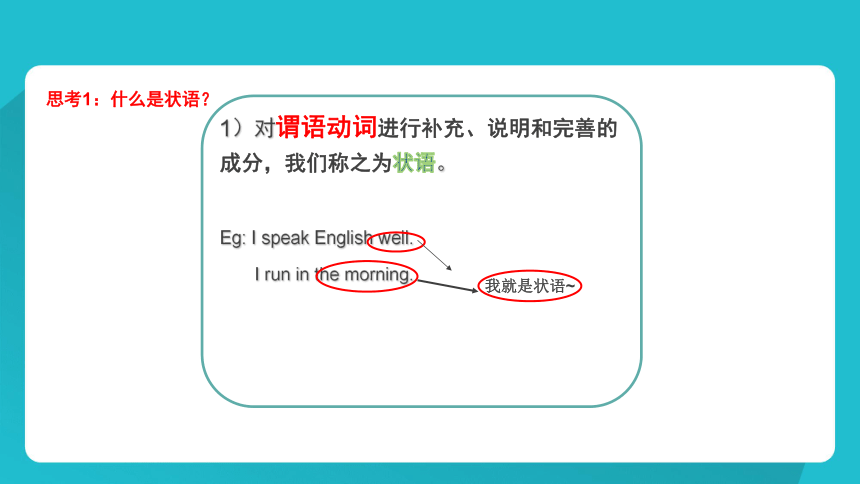

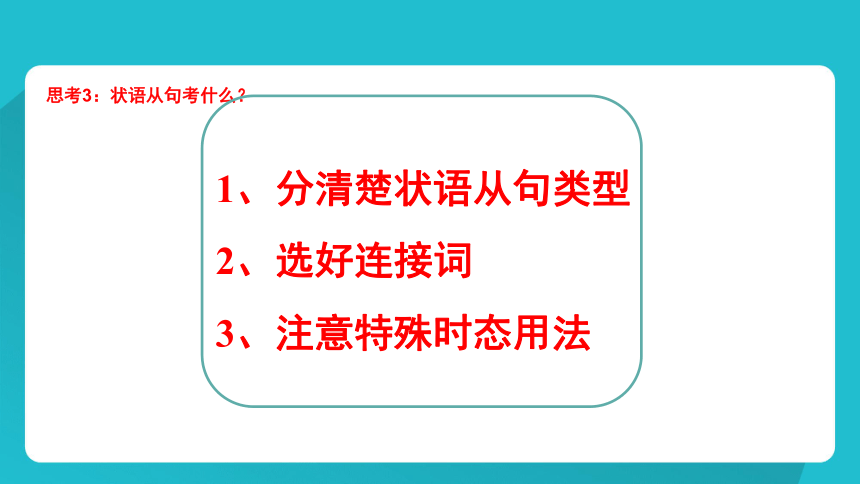


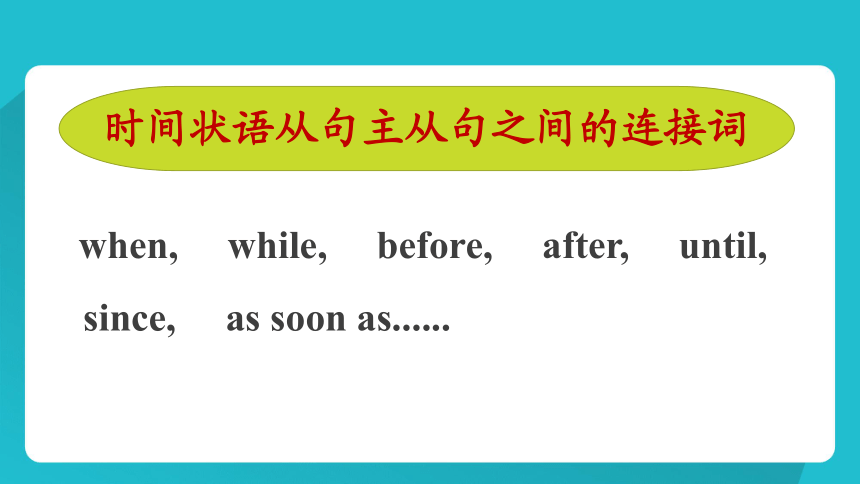


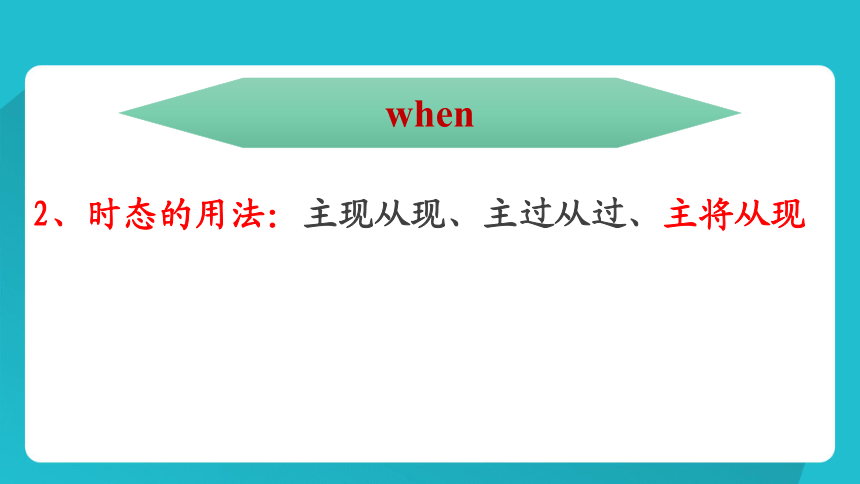

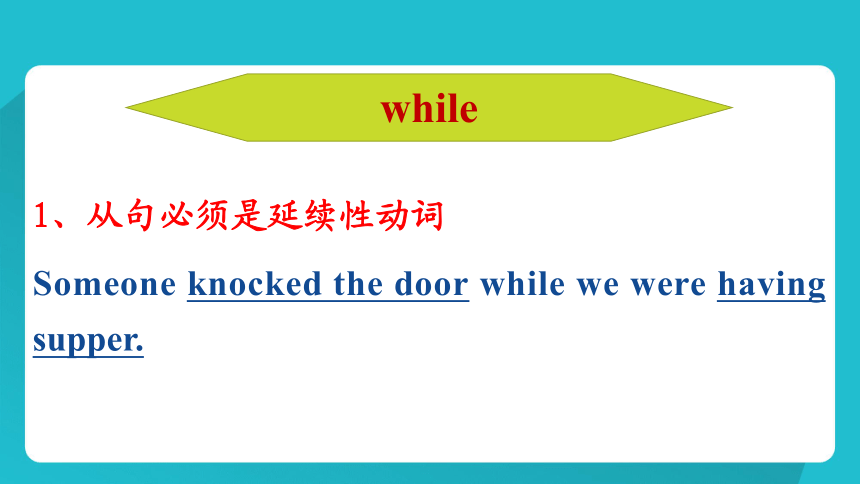
文档简介
(共52张PPT)
状语从句专题讲解
思考1:什么是状语?
1)对谓语动词进行补充、说明和完善的成分,我们称之为状语。
Eg: I speak English well.
I run in the morning.
我就是状语~
思考2:什么是状语从句?
I will call you tomorrow.
I will call you when he comes.
从句
主句
主句+连接词+从句
当状语部分是由句子构成的时候,
我们称这样的句子为状语从句。
思考3:状语从句考什么?
1、分清楚状语从句类型
2、选好连接词
3、注意特殊时态用法
时间状语从句
地点状语从句
原因状语从句
结果状语从句
目的状语从句
条件状语从句
让步状语从句
I will call you when he comes.
We?must?camp?where?we?can?get?water.
He is unhappy today because he was ill.
He is so fat that he must do sports everyday.
He got up early so that he could catch the bus.
You will go to college,if you study hard.
Although you were late for school,I wasn't angry .
状语从句分类
时间状语从句
其中对动作发生的时间进行描述的从句
when, while, before, after, until,
since, as soon as......
时间状语从句主从句之间的连接词
1、从句动作既可以是延续性动词,也可以是短暂性动词,如:
when
短暂性动词
延续性动词
1.The students were playing computer games when the teacher came in.
2.When I was walking along,I came across a friend of mine.
短暂性动词
延续性动词
时态
2、时态的用法:主现从现、主过从过、主将从现
when
1、I always drink coffee when I work.
2、When he gave me a present, I thanked him.
3、We will go out for a walk when the weather is fine。
时态
主现从现
主过从过
主将从现
1、从句必须是延续性动词
Someone knocked the door while we were having supper.
while
2、强调两个动作同时发生,主从句都用进行时,只能用while.
I was watching TV while my mother was cooking.
while
1. 肯定句:
。。。直到。。。
(表示主句发生的动作一直持续到某一时间才停止,因此,主句动词要使用延续性动词)
I have to stay here until the rain stops.
I watched TV until my mother returned last night.
until
2. 主句用于否定句:not.....,until...
直到。。。才。。。
表示主句的动作一直持续到某时才开始,主句动词既可以是延续动词,也可以是瞬间动词。
He didn't do his homework until his father came home.
3. 时态
He didn't do his homework until his father came home.
She doesn't watch TV until she finishes her homework every day.
I won't go out until I finish my homework.
主过从过
主将从现
主现从现
before :在。。。之前 (主句动作发生在从句动作之前)
You must brush you teeth before you go to bed.
after: 在。。。之后 (主句动作发生在从句动作之后)
You must close the door after you go to work.
since: 自从 (主句现在完成时,从句一般过去时)
I have been here since I was young.
as soon as : 一。。。就。。。
重点:时态用法上以主将从现最为常见。
We will go to the park as soon as the rain stops.
PRACTICE
1. My parents were watching TV while I _____ on the Internet.
A. search B. was searching
C. searched D. searching
2. I'll phone you ____ Mary comes home.
A. since B. until
C. as soon as D. while
3. Please turn off the light____you leave the classroom.
A. after B. before
C. until D. since
4. They didn't realise the importance of study ____ they left school.
A. when B. while
C. after D. until
原因状语从句
其中对动作发生的原因进行描述的从句
原因状语从句定义
He is absent today because he was ill.
因为他生病了,所以今天缺席。
原因状语从句通常由because原因。
常见连接词列表
连接词 语气 位置
(主句前/后) 意义
because 最强 前或后 “原因”;表客观因果关系。
as 较强 前 “由于”;把众人所知的事实当作理由。
since 较弱 前 “既然”;就对方陈述的事实作为理由。
for 次弱 后 “理由”;对某一事实进行推断的理由。
典型例句
He didn’t come to school because he was ill.
因为他生病了,所以没来上学。
As it is raining, we shall not go to the zoo.
由于下雨了,我们不应该去动物园。
Since you can’t answer the question, I’ll ask someone else.
既然你能回答这个问题,我去问问别人。
You couldn’t see him, for he wasn’t there.(不句首)
你看不到他,因为他没在那里。
易错点1
— Why are you late again? 为什么又迟到了?
— Because there is something wrong with my bike.
因为我自行车出问题了。
because常回答why引导的疑问句,从句一般位于主句后;why引导的问句,从句一般位于主句前。
易错点2
because和so不能同在一个句子中。
Because I was afraid, I didn’t go there.
Because I was afraid, so I didn’t go there.
易错点3
because和because of也有明显区别。because后面要跟从句,而because of后面跟名词短语。
He is late for school because it rains heavily.
He is late for school because of the heavy rain.
【典例2】He was late _______ the heavy rain.
A. because B. because of
C. though D. if
让步状语从句
表示:虽然,尽管,即使等概念
让步状语从句连接词大观
although
whatever=
尽管,虽然
无论什么
though
尽管,虽然
no matter what
无论什么
even if
即使
However (=No matter how) expensive it may be, I’ll take it.
No matter what I say or how I say it, he always thinks I’m wrong.
Even if I have to walk all the way I’ll get there.
It was an exciting game, though/although no goals were scored.
这两个连词意思大致相同,在一般情况下可以互换使用。在口语中,though较常使用,although比though正式,二者都可与yet,still连用,但不能与but连用。例如:
易错点1
⑴though, although
表示“虽然,纵然”之意
Though I believe it, yet I must consider.
尽管我相信这一点,但我还得考虑考虑。
目的状语从句
目的状语从句:从句部分是用以补充说明主句中谓语动词发生的目的的状语从句。
引导目的状语从句常用的连词有:
so that(以便), in order that(为了;以便)
E.g. You must speak more loudly so that you can
be heard by all.
(该句为目的状语从句的普遍形式)
【注意】in order that与in order to的区别:
in order that+从句
in order to+动词原形 (叫目的状语)
E.g.I get up early in order to catch the early bus.
in order that 为了,后接从句,做目的状语。
E.g. I get up early in order that I can catch
the early bus.
易错点1
结果状语从句
描述动作发生的结果
简介
结果状语从句常由so… that或such…that引导,掌握这两个句型,首先要了解so 和 such与其后的词的搭配规律。
so和 such
结果状语从句其规律由so与such的不同词性决定。
1、such 是形容词+修饰名词或名词词组
2、so 是副词,后面+修饰形容词或副词
3、so 还可与表示数量的形容词many, few, much, little连用,形成固定搭配。
易错点1
(1)so + adj + that从句
eg:It was so cold outside that we had to stop the game. (2) so + adv + that从句
eg:Tom ran so fast that he won first place.
(3) so + many/much/few/little(少) + 名词 + that从句
eg:There was so much work to do that Mary got tired.
(4) such+a+形容词 + 名词 + that从句
eg:It was such a cold day that we had to stop the game.
根据句意,用so或such填空。
?
1.?The?boy?is_____?young?that?he?can't?go?to?school.?
?
2.?He?told?us?_______?a?funny?story?that?we?all?laughed.?
?
3.?He?has?____few?books?to?read?that?he?has?to?borrow?
some books?from?the?library.?
4.?It?is_____?a?tall?building?that?I?can't?see?its?top.?
?
so
such
so
such
条件状语从句
其中对动作发生的条件进行描述的从句
条件状语从句连接词大观
if
as long as
如果,假如
只要
unless
除非,如果不
If it snows tomorrow, we’ll have a day or two off.
在条件状语从句中,要注意时态一致。一般情况下,主句是一般将来时,从句用一般现在时(即“主将从现”或“主情从现”或“主祈从现” );主句是过去时态,从句也要用相应的过去时态。
易错点1
“主将从现”:条件状语从句要用一般现在时态表示将来的动作。
If it doesn’t rain tomorrow, we’ll go to the park.
如果明天不下雨的话,我们就去公园。
(从现)
(主将)
易错点1
“主情从现”:条件状语从句中的主句可能是情态动词(can, may, might, must, should) + 动词原形的形式。
If you want to pass the exam, you must study hard.
如果你想考试及格,你就必须努力学习。
(从现)
(主情)
易错点1
“主祈从现”:条件状语从句中的主句可能是祈使句。
If you see him, please give him this note.
如果你看见他,把这个纸条给他。
(从现)
(主祈)
易错点2
意为“如果” 意为“是否”,= whether
引导条件状语从句。 引导宾语从句。
遵循“主将从现”“主情从现”“主祈从现”原则。 无此用法。
If you wants to see him, you can tell him to wait. 如果你想见他的话,叫他等好了。 I wonder if I should wear a hat.
我不知道该不该戴帽子。
if的用法对比
【典例1】用动词的正确形式填空。
1. If she ____ (be) kind to me , I __________(not argue) with her.
2. I want to know if he ________(come) tomorrow, if he _________(come), I __________(give) the massage to him.
考查条件状语从句的用法。遵循“主将从现”“主情从现”“主祈从现”原则。
is
won’t argue
will come
comes
will give
【典例2】—Lucy, what about going camping if it ______ tomorrow?
—Sounds great!
A. didn’t rain B. doesn’t rain
C. rains D. won’t rain
【典例3】If there ______ no buying and selling of animals, there ______ no killing in nature.
A. is; will be B. will be; will be
C. is; is D. will be; is
状语从句专题讲解
思考1:什么是状语?
1)对谓语动词进行补充、说明和完善的成分,我们称之为状语。
Eg: I speak English well.
I run in the morning.
我就是状语~
思考2:什么是状语从句?
I will call you tomorrow.
I will call you when he comes.
从句
主句
主句+连接词+从句
当状语部分是由句子构成的时候,
我们称这样的句子为状语从句。
思考3:状语从句考什么?
1、分清楚状语从句类型
2、选好连接词
3、注意特殊时态用法
时间状语从句
地点状语从句
原因状语从句
结果状语从句
目的状语从句
条件状语从句
让步状语从句
I will call you when he comes.
We?must?camp?where?we?can?get?water.
He is unhappy today because he was ill.
He is so fat that he must do sports everyday.
He got up early so that he could catch the bus.
You will go to college,if you study hard.
Although you were late for school,I wasn't angry .
状语从句分类
时间状语从句
其中对动作发生的时间进行描述的从句
when, while, before, after, until,
since, as soon as......
时间状语从句主从句之间的连接词
1、从句动作既可以是延续性动词,也可以是短暂性动词,如:
when
短暂性动词
延续性动词
1.The students were playing computer games when the teacher came in.
2.When I was walking along,I came across a friend of mine.
短暂性动词
延续性动词
时态
2、时态的用法:主现从现、主过从过、主将从现
when
1、I always drink coffee when I work.
2、When he gave me a present, I thanked him.
3、We will go out for a walk when the weather is fine。
时态
主现从现
主过从过
主将从现
1、从句必须是延续性动词
Someone knocked the door while we were having supper.
while
2、强调两个动作同时发生,主从句都用进行时,只能用while.
I was watching TV while my mother was cooking.
while
1. 肯定句:
。。。直到。。。
(表示主句发生的动作一直持续到某一时间才停止,因此,主句动词要使用延续性动词)
I have to stay here until the rain stops.
I watched TV until my mother returned last night.
until
2. 主句用于否定句:not.....,until...
直到。。。才。。。
表示主句的动作一直持续到某时才开始,主句动词既可以是延续动词,也可以是瞬间动词。
He didn't do his homework until his father came home.
3. 时态
He didn't do his homework until his father came home.
She doesn't watch TV until she finishes her homework every day.
I won't go out until I finish my homework.
主过从过
主将从现
主现从现
before :在。。。之前 (主句动作发生在从句动作之前)
You must brush you teeth before you go to bed.
after: 在。。。之后 (主句动作发生在从句动作之后)
You must close the door after you go to work.
since: 自从 (主句现在完成时,从句一般过去时)
I have been here since I was young.
as soon as : 一。。。就。。。
重点:时态用法上以主将从现最为常见。
We will go to the park as soon as the rain stops.
PRACTICE
1. My parents were watching TV while I _____ on the Internet.
A. search B. was searching
C. searched D. searching
2. I'll phone you ____ Mary comes home.
A. since B. until
C. as soon as D. while
3. Please turn off the light____you leave the classroom.
A. after B. before
C. until D. since
4. They didn't realise the importance of study ____ they left school.
A. when B. while
C. after D. until
原因状语从句
其中对动作发生的原因进行描述的从句
原因状语从句定义
He is absent today because he was ill.
因为他生病了,所以今天缺席。
原因状语从句通常由because原因。
常见连接词列表
连接词 语气 位置
(主句前/后) 意义
because 最强 前或后 “原因”;表客观因果关系。
as 较强 前 “由于”;把众人所知的事实当作理由。
since 较弱 前 “既然”;就对方陈述的事实作为理由。
for 次弱 后 “理由”;对某一事实进行推断的理由。
典型例句
He didn’t come to school because he was ill.
因为他生病了,所以没来上学。
As it is raining, we shall not go to the zoo.
由于下雨了,我们不应该去动物园。
Since you can’t answer the question, I’ll ask someone else.
既然你能回答这个问题,我去问问别人。
You couldn’t see him, for he wasn’t there.(不句首)
你看不到他,因为他没在那里。
易错点1
— Why are you late again? 为什么又迟到了?
— Because there is something wrong with my bike.
因为我自行车出问题了。
because常回答why引导的疑问句,从句一般位于主句后;why引导的问句,从句一般位于主句前。
易错点2
because和so不能同在一个句子中。
Because I was afraid, I didn’t go there.
Because I was afraid, so I didn’t go there.
易错点3
because和because of也有明显区别。because后面要跟从句,而because of后面跟名词短语。
He is late for school because it rains heavily.
He is late for school because of the heavy rain.
【典例2】He was late _______ the heavy rain.
A. because B. because of
C. though D. if
让步状语从句
表示:虽然,尽管,即使等概念
让步状语从句连接词大观
although
whatever=
尽管,虽然
无论什么
though
尽管,虽然
no matter what
无论什么
even if
即使
However (=No matter how) expensive it may be, I’ll take it.
No matter what I say or how I say it, he always thinks I’m wrong.
Even if I have to walk all the way I’ll get there.
It was an exciting game, though/although no goals were scored.
这两个连词意思大致相同,在一般情况下可以互换使用。在口语中,though较常使用,although比though正式,二者都可与yet,still连用,但不能与but连用。例如:
易错点1
⑴though, although
表示“虽然,纵然”之意
Though I believe it, yet I must consider.
尽管我相信这一点,但我还得考虑考虑。
目的状语从句
目的状语从句:从句部分是用以补充说明主句中谓语动词发生的目的的状语从句。
引导目的状语从句常用的连词有:
so that(以便), in order that(为了;以便)
E.g. You must speak more loudly so that you can
be heard by all.
(该句为目的状语从句的普遍形式)
【注意】in order that与in order to的区别:
in order that+从句
in order to+动词原形 (叫目的状语)
E.g.I get up early in order to catch the early bus.
in order that 为了,后接从句,做目的状语。
E.g. I get up early in order that I can catch
the early bus.
易错点1
结果状语从句
描述动作发生的结果
简介
结果状语从句常由so… that或such…that引导,掌握这两个句型,首先要了解so 和 such与其后的词的搭配规律。
so和 such
结果状语从句其规律由so与such的不同词性决定。
1、such 是形容词+修饰名词或名词词组
2、so 是副词,后面+修饰形容词或副词
3、so 还可与表示数量的形容词many, few, much, little连用,形成固定搭配。
易错点1
(1)so + adj + that从句
eg:It was so cold outside that we had to stop the game. (2) so + adv + that从句
eg:Tom ran so fast that he won first place.
(3) so + many/much/few/little(少) + 名词 + that从句
eg:There was so much work to do that Mary got tired.
(4) such+a+形容词 + 名词 + that从句
eg:It was such a cold day that we had to stop the game.
根据句意,用so或such填空。
?
1.?The?boy?is_____?young?that?he?can't?go?to?school.?
?
2.?He?told?us?_______?a?funny?story?that?we?all?laughed.?
?
3.?He?has?____few?books?to?read?that?he?has?to?borrow?
some books?from?the?library.?
4.?It?is_____?a?tall?building?that?I?can't?see?its?top.?
?
so
such
so
such
条件状语从句
其中对动作发生的条件进行描述的从句
条件状语从句连接词大观
if
as long as
如果,假如
只要
unless
除非,如果不
If it snows tomorrow, we’ll have a day or two off.
在条件状语从句中,要注意时态一致。一般情况下,主句是一般将来时,从句用一般现在时(即“主将从现”或“主情从现”或“主祈从现” );主句是过去时态,从句也要用相应的过去时态。
易错点1
“主将从现”:条件状语从句要用一般现在时态表示将来的动作。
If it doesn’t rain tomorrow, we’ll go to the park.
如果明天不下雨的话,我们就去公园。
(从现)
(主将)
易错点1
“主情从现”:条件状语从句中的主句可能是情态动词(can, may, might, must, should) + 动词原形的形式。
If you want to pass the exam, you must study hard.
如果你想考试及格,你就必须努力学习。
(从现)
(主情)
易错点1
“主祈从现”:条件状语从句中的主句可能是祈使句。
If you see him, please give him this note.
如果你看见他,把这个纸条给他。
(从现)
(主祈)
易错点2
意为“如果” 意为“是否”,= whether
引导条件状语从句。 引导宾语从句。
遵循“主将从现”“主情从现”“主祈从现”原则。 无此用法。
If you wants to see him, you can tell him to wait. 如果你想见他的话,叫他等好了。 I wonder if I should wear a hat.
我不知道该不该戴帽子。
if的用法对比
【典例1】用动词的正确形式填空。
1. If she ____ (be) kind to me , I __________(not argue) with her.
2. I want to know if he ________(come) tomorrow, if he _________(come), I __________(give) the massage to him.
考查条件状语从句的用法。遵循“主将从现”“主情从现”“主祈从现”原则。
is
won’t argue
will come
comes
will give
【典例2】—Lucy, what about going camping if it ______ tomorrow?
—Sounds great!
A. didn’t rain B. doesn’t rain
C. rains D. won’t rain
【典例3】If there ______ no buying and selling of animals, there ______ no killing in nature.
A. is; will be B. will be; will be
C. is; is D. will be; is
同课章节目录
- Module 1 Wonders of the world
- Unit 1 It's more than 2,000 years old.
- Unit 2 The Grand Canyon was not just big.
- Unit 3 Language in use
- Module 2 Public holidays
- Unit 1 My family always go somewhere interesting a
- Unit 2 We have celebrated the festival since the f
- Unit 3 Language in use
- Module 3 Heroes
- Unit 1 She trained hard,so she became a great play
- Unit 2There were few doctors, so he had to work ve
- Unit 3 Language in use
- Module 4 Home alone
- Unit 1 I can look after myself, although it won’t
- Unit 2 I became so bored with their orders that I
- Unit 3 Language in use
- Module 5 Museums
- Unit 1 Don't cross that rope!
- Unit 2 If you ever go to London, make sure you vis
- Unit 3 Language in use
- Module 6 Problems
- Unit 1 If I start after dinner, I'll finish it be
- Unit 2 If you tell him the truth now, you will sho
- Unit 3 Language in use
- Revision Module A
- Module 7 Great books
- Unit 1 We're still influenced by Confucius's idea
- Unit 2 It is still read and loved.
- Unit 3 Language in use
- Module 8 Sports life
- Unit 1 Daming wasn't chosen for the team last time
- Unit 2 He was invited to competitions around the w
- Unit 3 Language in use
- Module 9 Great inventions
- Unit 1 Will computers be used more than books in t
- Unit 2 Will books be replaced by the Internet?
- Unit 3 Language in use
- Module 10 Australia
- Unit 1 I have some photos that I took in Australia
- Unit 2 The game that they like most is Australian
- Unit 3 Language in use
- Module 11 Photos
- Unit 1 He's the boy who won the photo competition
- Unit 2 The photo which we liked best was taken by
- Unit 3 Language in use
- Module 12 Save our world
- Unit 1 If everyone starts to do something, the wor
- Unit 2 Repeat these three words daily: reduce, reu
- Unit 3 Language in use
- Revision Module B
